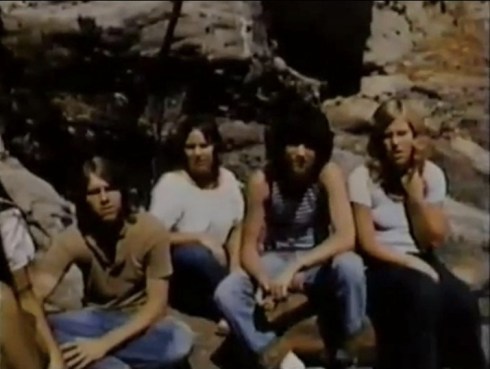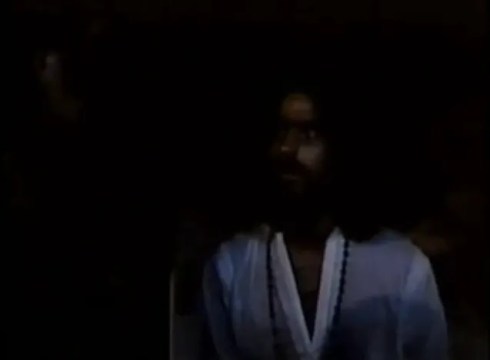“Scream – So they’ll know where to find your body!”
THE NIGHT GOD SCREAMED (1971)
Directed by Lee Madden (Angel Unchained 1970, The Manhandlers 1975), he offers us another cult hippie psycho drama feeding off the unsettling vibe and turbulence of the Charles Manson hysteria.

No matter how often I think I’ve uncovered the most obscure cult thriller, there’s always another lurking under a rock somewhere for me to feast my wide-eyed stare upon, mouth agape, and mind working over time to integrate the confluence of cultural debris that emerges like the dregs when you roil the sediment secretly settled on the bottom of the cinematic barrel. This is one such obscure film.
Starring screen beauty Jeanne Crain (Leave Her To Heaven (1945), Pinky (1949), A Letter to Three Wives (1949). The Tattered Dress (1957).

Who probably would have rather been given a better role and script, plays the frail and persecuted Fanny Pierce. Alex Nicol plays Fanny’s husband, the man in search of his own prosperous church in a better neighborhood. Preacher Willis Pierce (How could we ever forget Nicol’s wonderfully grimy, pathetic, and bizarre character Mickey in 1958s The Screaming Skull, or his dizzying performance as the drunken loser husband Jay Fowler in Look in Any Window 1961) No… he’s gotten to play a man’s man plenty, but he is sort of a victim magnet.


Dan Spelling plays the bourgeois Judge Coogan’s son and the irritatingly preppy Peter. Barbara Hancock plays sister Nancy Coogan, Dawn Cleary plays sister Sharon, and very busy actor and stuntman Gary Morgan plays little brother Jimmy.
The Night God Screamed opens with a foreboding shape floating as if gliding on top of water, through the eerie sylvan landscape wearing a monk’s robe, his large, draped cowl-like hood obscuring the man’s face altogether. He grips an arcane cruciform staff. He approaches a small pond inhabited by the frolicking free love rejects, society’s much-reviled flower children of the ’60s & ’70s sub-subculture. In other words, as South Park’s irreverent and outrageous Eric Cartman would say, ‘dirty hippies’ have lots of random sex and get high.
The pervasive cut-off tone reveals that they belong to a Manson-esque cult, which is led by the vitriolic Billy Joe Harlan, a fanatical cult leader who baptizes a few followers and then proceeds to spout a trippy fire and brimstone rant, his own distorted anti-socially virulent version of the Gospel. Much like Manson, his rhetoric engenders a lot of animosity toward the establishment, law enforcement, or, if you will, ‘pigs’, citizens, squares, and anybody who doesn’t see the world through Billy Joe’s lens.
Billy Joe is a violent sociopath who commands his fledgling minions to destroy any phony preachers, combat pigs, and try to bring his new version of the Gospel to the youth of America.
Hung up on how Christ was betrayed, he riles his flock of murderous flower children to manifest the power to punish those who do not follow his gospel. To make an example of the dangers of dissension and betrayal, he chooses a young girl who has refused to be baptized. And so he gives the word to his faceless, hooded angel of death named ‘The Atoner’ to drown her in front of the flock.
“They was all just a bunch of sinners, Lord, fighting and bothering each other…But I saved them, Lord! I showed them that using dope was the way to turn on to You!”
“We got trouble! The Heat won’t leave us alone! They want to bust us for being hooked on you! Them pigs is watching us, Lord…they don’t dig our kinda thing!”
As this soldier of God, known as THE ATONER, executes the young girl in front of the mindless youth, the rest of the nasty flock watches without doing a single thing to help the poor girl as she is submerged under the baptismal waters, causing her to drown.
The film cuts away to a scene where the wife and good Christian Fanny Pierce (Jeanne Crain) is bringing groceries to the mission where her preacher husband (Alex Nicol) is feeding a hungry collection of bums and down-and-outers. Right before she can make it inside with her bag of groceries, a very unsavory bum with quite an unattractive tongue, mugs her for the brown paper bag of food, leaving her standing ironically empty-handed and assaulted right outside the very soup kitchen where she and her husband have been trying to bring the good works of Jesus to these poor destitute men.
Fanny starts to have her own crisis of faith and becomes disillusioned with her husband and his mission. Preacher Willis Pierce appears more worried about the loss of the groceries than concerned for his own wife’s safety. He possesses a resolute patriarchal hubris with his grandiose dreams of bringing the gospel to his people, much like Billy Joe, yet not imbued with vengeful and malevolent fortitude.
Willis wants to build a sizable church in ‘better areas of town’, which would mean more money, more offerings, and more notoriety to his name. This is the kind of man Billy Joe despises and is on a crusade to annihilate with his cult of venomous sycophants.
Fanny tells Willis, “God isn’t going to make our house payment!”
In a ridiculous gesture, Willis’s scheme is to erect his new mammoth wooden cross at the revival meeting he plans on holding later that night. He believes that this will help bring in enough cash for ‘offerings’ to start up his new church. So, without consulting Fanny, Willis spends an enormous amount of money on the large, ludicrously enormous artifact that symbolizes Jesus’ sacrifice but smacks of Preacher Willis’ own egoism. He has used all their savings on this religious ‘manstrosity’, that he will erect in the revival hall, which he has rented in a more affluent part of town.
As they haul the large wooden totem across the countryside on top of their old truck, the tension between Fanny and Willis grows. Fanny tells Willis that she’s sacrificed over twenty-five years of her life in service to his cause. Willis tries to convince her that the giant cross will be their ‘meal ticket.’
While stopping at a gas station, Billy Joe and one of his religious biker culties Izzy (Richard Smedley Brain of Blood, The Abductors 1972, The Naughty Stewardesses 1975 ) espy the Pierces and their truck with the cross-tied on top and pull in alongside them with their motorcycle. It’s here that sets forth the moment of confrontation with fate, and the narrative’s tragic and violent relinquishment of faith sparks.
Billy Joe begins to question Preacher Willis, fascinated with his sizable wooden cross, and wants to know what he plans to do with it, asking about the plans for the revival meeting.
It is a moment that points out the deliberate contrary notions of religion while simultaneously forging an ironic relationship between the extreme zeal and the unfettered fanaticism of the two self-styled evangelists.
Willis is prideful and enthusiastically offers his fund-raising motivations for his ‘mission’. Billy Joe begins to formulate his vexation and sets out to dispense Willis with his wrath for being a false and ‘plastic prophet’. As the Pierces continue on their road trip to the revival meeting, Billy Joe summons his nefarious apostles and unleashes his craving to destroy Preacher Willis.
“We’re going to a revival meeting tonight… We’re going on a crusade! Just you, and me, Izzy… And the Atoner!”
Preacher Willis gives his sermon at the College Lecture Hall. Unfortunately, the congregation does not bestow upon him the funds needed for his plans to build his church in a ‘good’ neighborhood. After the sermon, Fanny and Willis’ assistant Paul go outside, leaving Willis alone in the revival hall.
In a scene that is quite disturbing, as the events happen mostly in an utter bluish darkness or diverted to the realm off camera, the cult attacks Willis. They are draped in shadow. Billy Joe begins to persecute Willis, pronouncing him a ‘ false prophet’ and demanding that he be put to death. And so while Billy Joe’s followers restrain and torture poor Willis, the Atoner slowly and painfully nails Willis to his own mundanely magnificent cross.
Fanny is startled by the screams of her husband, who is crying out in agony. She comes back inside the hall, but shrouds herself in the darkness, afraid for her own life, as he cries, “Fanny, Help me, For God’s sake, Help me.” She remains motionless, doing nothing to help him; he is left to die alone, now a Christ-figure of the film.
The scene switches to a courtroom, where Billy Joe and his cult followers are all on trial for the murder of Willis Pierce. Judge Coogan pronounces a death sentence on the hippie messiah. Billy Joe explodes into a tirade.
“You son of a bitch! You DUMB son of a bitch! YOU’RE MAKING ME A MARTYR! AHAHAHAHAHA!”
While Billy Joe is convicted and sentenced to death, the remaining cult members encircle and besiege Fanny, vowing revenge for Billy Joe. Fanny, who was already starting to devolve in her encumbered world, now anguished with guilt for not having helped her husband Willis in his moment of horrific need, wanders away in a somnolent haze.
She remains in this state of dissociation for the rest of the film. The judge hires Fanny as a sort of matron to help with his two sons and teenage daughters, who need to be kept in line, shown morals, and keep from acting too wild while their parents go away on a weekend vacation. The Judge grounds the kids and makes them stay in the house with Fanny, who is still wholly uptight and out of her mind with guilt over her husband’s brutal death.
This breathes even more agitation into the film, which is saturated with male hubris and female hysteria. The archetypal hysterical woman lives once again in the embodiment of Fanny Pierce.
On the way to bringing Fanny to his house for the weekend, the Judge dismisses her worries about the two hippies on motorcycles who seem to be following them and then goes on to instill some social relevance in the bigger picture. “Those kids, like the ones who murdered your husband… they come from broken homes… poor education… they’re just dropouts! Not like ‘my’ kids!”
Of course, we are to understand that this is a cue of foreboding irony, reflexive and dilating, as Fanny is charged to take care of the Judges adult teens, who inadvertently become mixed up in the nightmare, as the Atoner and remaining worshipers take siege of the household and terrorize Fanny and the teenagers. Fanny becomes even more unhinged, amidst an ensemble of entitled youths who are the binary figures of the film’s contemporary youth culture. One set of outliers rebelling against a system that reviles them, and the other is just as combative and anti-social, yet given the opportunities to reflect their personal freedoms because of affluence and social capital. Dan Spelling as Peter Coogan, the judge’s eldest son, is a bit of a social superior, a quiet sociopathic teen whose poison is brewing under the surface of his perfectly pressed pants and yuppie tennis sweater.




















